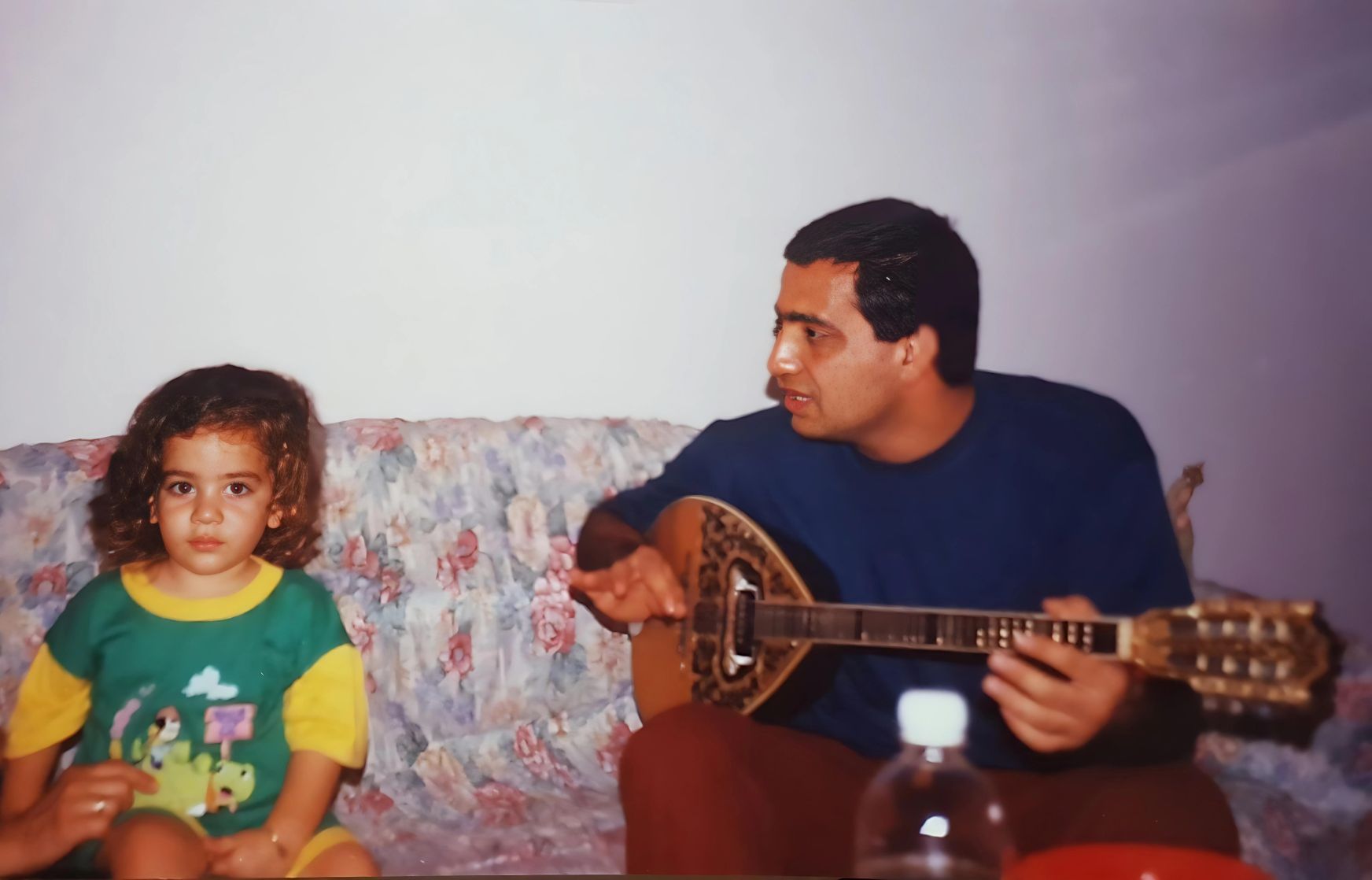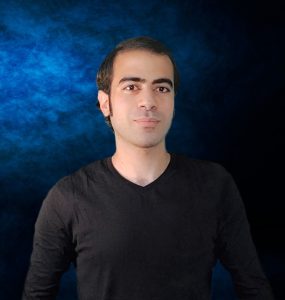אני מרגיש שנולדתי להיות מוזיקאי. מוזיקה היא הדבר המשמעותי ביותר עבורי בחיי. זוהי דרך הבעה נפלאה שגורמת לרגש עילאי במיוחד כאשר יש קשר תרבותי רגשי חזק, זו אחת הדרכים להביע את מה שלא ניתן בדרך אחרת וזה הופך את המוזיקה לדבר חשוב ומיוחד.
את דרכי המוזיקלית התחלתי בגיל 3 בו קיבלתי את שיעורי הבוזוקי הראשונים שלי. ניגנתי על מספר כלי נגינה ביניהם כינור, עוד, פסנתר, גיטרה אך הבוזוקי תמיד היה הכלי העיקרי והראשון שלי.
יש כאלה שאומרים שמוזיקה היא דבר אוניברסלי המחברת בין אנשים אבל אצלי מוזיקה היא חלק בלתי נפרד מתרבות. באופן טבעי בן אדם בוחר להיטמע בתרבות בו הוא גדל ולראות את ערכי תרבותו כמרכז עולמו, כדבר המבסס את זהותו.
אני גדלתי עם תרבות הכוללת שפה, מנהגים, ערכים. זה היה כמו לגדול בבועה סביב תרבות אחת ולא להיחשף או להיות מושפע סביבתית מתרבויות אחרות. זכיתי לקבל השראה גדולה ממוזיקאים גדולים במוזיקה ותרבות לה היסטוריה עשירה ומפוארת שלצערי נגדעה ממני. ואותם מוזיקאים גם לא זכו לתהילה הגדולה אותה הם היו אמורים לקבל.
מאובדן גדול של תרבות, שפה ואנשים, נסחפתי להשתקע ביוון בתרבות ובמוזיקה היוונית שנהפכה לחלק ממני ואותה אני חי יום יום. אפשר לומר שהפסדתי תרבות אחת ואומצתי על ידי תרבות אחרת, זו תהיה הדרך הטובה ביותר להבין את זה.
מוזיקה קלאסית
מוזיקה קלאסית היא הבסיס למוזיקה. אני חושב שכל מוזיקאי צריך להתחיל את תחילת דרכו מהאזנה ולימוד של יצירות קלאסיות של המלחינים הגדולים, מי שחושב אחרת אז לא מבין במוזיקה.
גם אני התחלתי מנגינה של יצירות קלאסיות של מלחינים פופולאריים כמו מוצרט, בטהובן, באך, איסק אלבניס אותם הייתי מנגן בפסנתר, כינור וגיטרה.
רבים לא יודעים כי המוזיקאים הגדולים ביותר של המזרח התיכון החלו את השכלתם המוזיקלית ממוזיקה קלאסית מערבית. רוב המוזיקאים היהודים שהגיעו מארצות ערב מאוניברסיטאות ומוסדות לימוד מכובדים התחילו את דרכם כך. גם המלחין והאמן הגדול מוחמד עבד אל-וואהב הושפע מאוד מיצירות קלאסיות מערביות.
אוכל לומר שזה כמו שלב אותו כל מוזיקאי טוב עובר בחייו עבור ההשכלה וההבנה המוזיקלית. האמת, לא יצא לי לנגן יצירה קלאסית כבר תקופה ארוכה כי זו לא המוזיקה אליה אני מחובר ולא זו המערבית שכבשה את ליבי. אני זכיתי להכיר ולקבל השארה ממוזיקאים גדולים שנחשבו למוצרט של המזרח התיכון.
תמונה שלי, בגיל 3, בשיעור עם ג'ורג' בר בביתו ביפו. זו הייתה תקופה יפה בה הייתה נפוצה האחווה, הכבוד והאחדות בין אנשים. בין אם יהודים, נוצרים או מוסלמים, חיינו וגדלנו יחדיו עם תרבות ושפה משותפת. יש לי הרבה געגועים מתקופת הילדות, בין רמת גן, יפו וירושלים, זכיתי לקבל השראה גדולה מכל האמנים הגדולים.

הדבר המיוחד הוא שהיה איחוד בין כל מוזיקאי שהגיע מארצות ערב. בין אם זה מוזיקה מצרית, סורית, לבנונית, עיראקית, כווייתית ואפילו טוניסאית. המשותף בין כולם שהם חלקו יחדיו את התרבות והשפה הערבית, אפילו אם לא ברובה אצל חלק מהתרבויות, היה חיבור משותף ביניהם אבל אוכל לומר שלא הצלחתי להתחבר כלל למוזיקה המרוקאית או לאלג'יראית מכיוון שזו לא מוזיקה ערבית, זוהי מוזיקה אנדלוסית עם השפעות מערביות וצפון אפריקאיות.
עוּד ומקאמים
בהמשך למדתי את תורת המקאם והושפעתי ממוזיקאים גדולים שהיו אנשים מכובדים, גדולי המוזיקאים במזרח התיכון כולל ממשפחתי. קיבלתי השראה גדולה ממוזיקאים כמו יוסף שם טוב ז"ל (שזכה לכינוי יוסף אל עוואד), פריד צדוק ז"ל, אברהם סלמאן ז"ל, אלברט אליאס ז"ל, נעים רג'ואן ז"ל, פליקס מזרחי ז"ל, סלים אל-נור ז"ל ו-אליאס שאשא ז"ל. עצוב מאוד אבל כולם כבר לא בחיים אבל המורשת שהשאירו אחריהם וזכרונם ישארו לעד.
למדתי לנגן בעוּד ובכינור והערצתי יצירות מוזיקליות במוזיקה הטורקית קלאסית של מוזיקאים מהתקופה העות'מאנית. בביקוריי הרבים עם הוריי בעיר איסטנבול קיבלתי שיעורים על סאז ועוד טורקי. למדתי גם שירים בסגנון הארבסק שהוא ז'אנר במוזיקה הטורקית שקיבל השפעה מהמוזיקה הערבית.
בהמשך גיליתי שלמוזיקה העותומאנית או בשמה האחרת המוזיקה הטורקית הקלאסית הישנה יש השפעה גדולה על המוזיקה היוונית וכמובן גם על המוזיקה הערבית הקלאסית. היה מוזיקאי עותומאני בשם זכריה אפנדי שנפטר בשנת 1740 והיו לו יצירות קלאסיות בטורקית והוא היה בכלל יווני שהיה עושה מזמורים בכנסייה הנוצרית אורתודוקסית.
רבים לא יודעים כי המוזיקה הערבית הקלאסית שאבה את השראתה ממקורות קדומים רבים, גם מהמוזיקה הביזנטית, שלמעשה מבחינה היסטורית החלה כמזמורים בבתי המקדש ואז בימי הביניים פותחה על ידי הכנסיות הקתוליות.
המוזיקה הקלאסית המערבית שונה מהמוזיקה הקלאסית המזרחית וההבדל הגדול ביניהם הוא חופש האלתור שקיים בזו המזרחית. אגב כאשר אני מזכיר את המילה מזרחית, אין לזה קשר למה שמכונה "מוזיקה מזרחית" בישראל וכתבתי על כך מאמר בעבר בנושא.
אני בקיא במקאמים בערבית ובנגינה שלהם בעוּד, בכינור, באורגן וגם בשירה. יש לי ידע גם במקצבים הערבים ונגינתם בכלי הקשה כמו דרבוקה, ריק מצרי ותופים.
אני בקיא במוזיקה הערבית הקלאסית, המוושאחאת וגם שירי הפולקלור הישנים כמעט מכל ארצות ערב: מצרים, סוריה, לבנון וגם עיראק. אני קורא, כותב, שר ומבין מספר דיאלקטים בשפה הערבית. מהבית נחשפתי לשפה הערבית עיראקית בניב היהודי בגדאדי שהוריי דיברו בבית וזו היא שפת אם בשבילי. זו שפה שהולכת ונכחדת כיום ולכן כדי לשמר אותה החלטתי להעלות קטעי וידיאו בטיקטוק עבור בני העדה, בו אני מדבר בשפה העיראקית בניב היהודי.
נגן בוזוקי
בוזוקי הוא כלי המיתר הראשון והעיקרי בו אני מנגן. רבים שואלים אותי כיצד הגעתי לבוזוקי ולמוזיקה היוונית. החשיפה למוזיקה היוונית הייתה מהבית. לאבא שלי היו את כל תקליטי הויניל הישנים של הזמרים היוונים מז'אנר הלאיקה.
לאחר מכן ביקרתי ביוון, שם גם קיבלתי שיעורי בוזוקי והתעמקתי במוזיקה והתרבות היוונית. הרגשתי שבמהלך ביקוריי ביוון, לא חוויתי את שהותי שם כמטייל אלא כמקומי. נטמעתי בתרבות ובאנשים ונוצר חיבור עמוק ורגשי.
לקחתי חלק באנסמבל הקולי ווצ'ה די דונה בניצוחה של ג'ודי אקסלרוד, כנגן בוזוקי ומבצע של שירים יווניים מסורתיים בעיבודים ייחודיים להרכב. הופעתי במסגרת האנסמבל במוקדים תרבותיים חשובים, ביניהם מרכז התרבות היווני בירושלים והכנסייה הסקוטית סנט אנדרוז בעיר.
קלידן
פסנתר היה הקלידים הראשונים בהם ניגנתי ולאחר מכן על אורגנים ומקלדות ליווי שונות. כיום אני מנגן על מקלדת הליווי EA-7 של רולנד עליה ערכתי סקירה מקיפה והשוואה למקלדות ליווי אחרות של החברות המובילות.
עמלתי רבות על הכנת סאונדים ומקצבים בקלידים. יצרתי סט מקצבים ייחודי מאפס עבור מקלדת הליווי רולנד EA-7 של כל המקצבים במוזיקה היוונית כולל דגימת צלילים שונים שמהווים חלק מהסט.
מאסטרו ורב-נגן
אני מולטי-אינסטרומנטליסט, מה שבשפה העברית נקרא רב-נגן. מגיל מאוד צעיר למדתי לנגן על מספר כלי נגינה ביניהם פסנתר, כינור, עוד, סאז, גיטרה, קלרינט, מלודיקה, כלי הקשה שונים (תופים, דרבוקה ותוף ריק) וכמובן הבוזוקי שתמיד היה כלי המיתר הראשון והעיקרי שלי.
כמעבד מוזיקלי, יכולת הנגינה במספר כלי נגינה מאפשרת לי לדעת בדיוק כיצד כל תפקיד אמור להישמע וכיצד להביע את האופי של היצירה עצמה. אני נוהג להיות דייקן ושמרני בעיבוד של יצירה מוזיקלית אבל עדיין להכניס את החותמת וההטמעה שלי כאמן בין אם זה קטע אלתור או קישוטים מוזיקליים.
הכינור והעוד אלו כלי נגינה שאני באמת מתגעגע אליהם אבל זה עבורי זה חלק מהאובדן של תרבות ואנשים. זה משהו שחסר עבורי ואת החוסר הזה השלים הבוזוקי והתרבות היוונית אליה נחשפתי ואומצתי.
אני חושב שאחת היכולות שלי שהופכות אותי למוזיקאי טוב היא הזיכרון הפנומנלי ויכולת ריכוז היתר מבלי להיות מוסח דעת. תווים הם דבר חשוב מאוד למוזיקאים המנגנים בתזמורת במיוחד במוזיקה הקלאסית אך מעטים יכולים לזכור ולשנן יצירות ארוכות בזיכרון כמו לדוגמה במוזיקה הקלאסית הערבית בה כל יצירה מוזיקלית יכולה להימשך כשעה.
כיום אני יודע אלפי שירים ביוונית בהם כל שיר אני זוכר את מילות השיר במלואם, מי המלחין וכותב המילים ומסוגל לנגן בזמן אמת במיידית את השיר בטרנספוזיציה שונה על מספר כלי נגינה כאשר הכלי העיקרי שלי הוא הבוזוקי. כל הידע הזה הוא לצד מאות יצירות נוספות במוזיקה הקלאסית הערבית.
זמר
מעבר להיותי מוזיקאי, אני גם זמר ששר ביוונית, טורקית וערבית. כדובר השפה היוונית בניגוד לזמרים אחרים בישראל שבוחרים להמציא מילים שלא קיימות ו"לשיר ביוונית", אני שר כל מילה ומילה בהגייה ובדיקציה הנכונה. וכך גם לגבי השפה הערבית, אני קורא ומבין את מה שאני שר. בטורקית אני נעזר בחברים מיוון ומקומיים מטורקיה שעוזרים לי להבין את משמעות המילים ואת ההגייה הנכונה של כל מילה.
אני חושב שזה מאוד חשוב שזמר יבין ויבטא את המילים נכון בשפה בה הוא שר אחרת מה שווים המילים ובשביל מה לשיר מלכתחילה? הרי שירים מתבססים על להביע משהו כתוב בדרך מוזיקלית ולא ההפך.
אני גם מבין את משמעות המילים כך שאני מאוד מחובר לשירים שאני שר ובמיוחד אני אוהב את השירים הישנים שהמילים שלהם מאוד מדברות אליי.
ישנם זמרים כיום המתהדרים שהם יודעים לבצע מוואל אבל הם כמעט כולם לא באמת מבינים מה הם ביצעו. אני חושב שבדיוק כמו להיות נגן, כך זמר צריך להיות מוזיקאי קודם להיות זמר, לדעת לשיר בדיוק, בדיקציה הנכונה בשפה הוא שר ואם מדובר במוזיקה ערבית אז גם לשלוט בכל המקאמים.
מורה למוזיקה
עבורי הלימוד הוא חלק בלתי נפרד בלהיות מוזיקאי. אני לוקח חלק במסע הלימוד של מוזיקאים מתחילים ומתקדמים ומשריש עבורם את הכללים, החוקים והידע המוזיקלי הנכון, בדיוק כפי שלימדו אותי מוריי כאשר הייתי צעיר.
כמורה לבוזוקי, הוצאתי לאור את ספר "קסם הבוזוקי" שכולל את כל הידע התאורטי הדרוש ללימוד נגינה בכלי וזכה להצלחה מאז השקתו בשנת 2009. הספר גם תורגם לשפה האנגלית ונהפך לרב מכר בחו"ל. בהמשך הוצאתי גם קורסים מקוונים בשפה העברית והאנגלית ללימוד מוזיקה שנהפכו לפופולאריים.
ללמוד מוזיקה מהבסיס זה כמו ללמוד שפה חדשה לכן חשוב לי להתחיל מהלימוד של החלק התאורטי שהוא בעצם שפת המוזיקה אוניברסלית שמאפשרת תקשורת מוזיקלית.
הכלי העיקרי עליו אני מלמד הוא הבוזוקי בו אני מלמד מוזיקה יוונית אך אני גם מלמד על כלי נגינה נוספים ביניהם קלידים, גיטרה, עוד, כינור (ערבי), תופים וכלי הקשה (דרבוקה, ריק מצרי).
נכתב על ידי:

יוסי אהרון
מוזיקאי, זמר, קלידן, מעבד מוזיקלי ונגן בוזוקי וירטואוז המתמחה בז'אנר היווני. רב-נגן המנגן על מספר כלי נגינה. בעל ידע והכרות רבה עם התרבות, השפה והמוזיקה היוונית. קראו עוד »